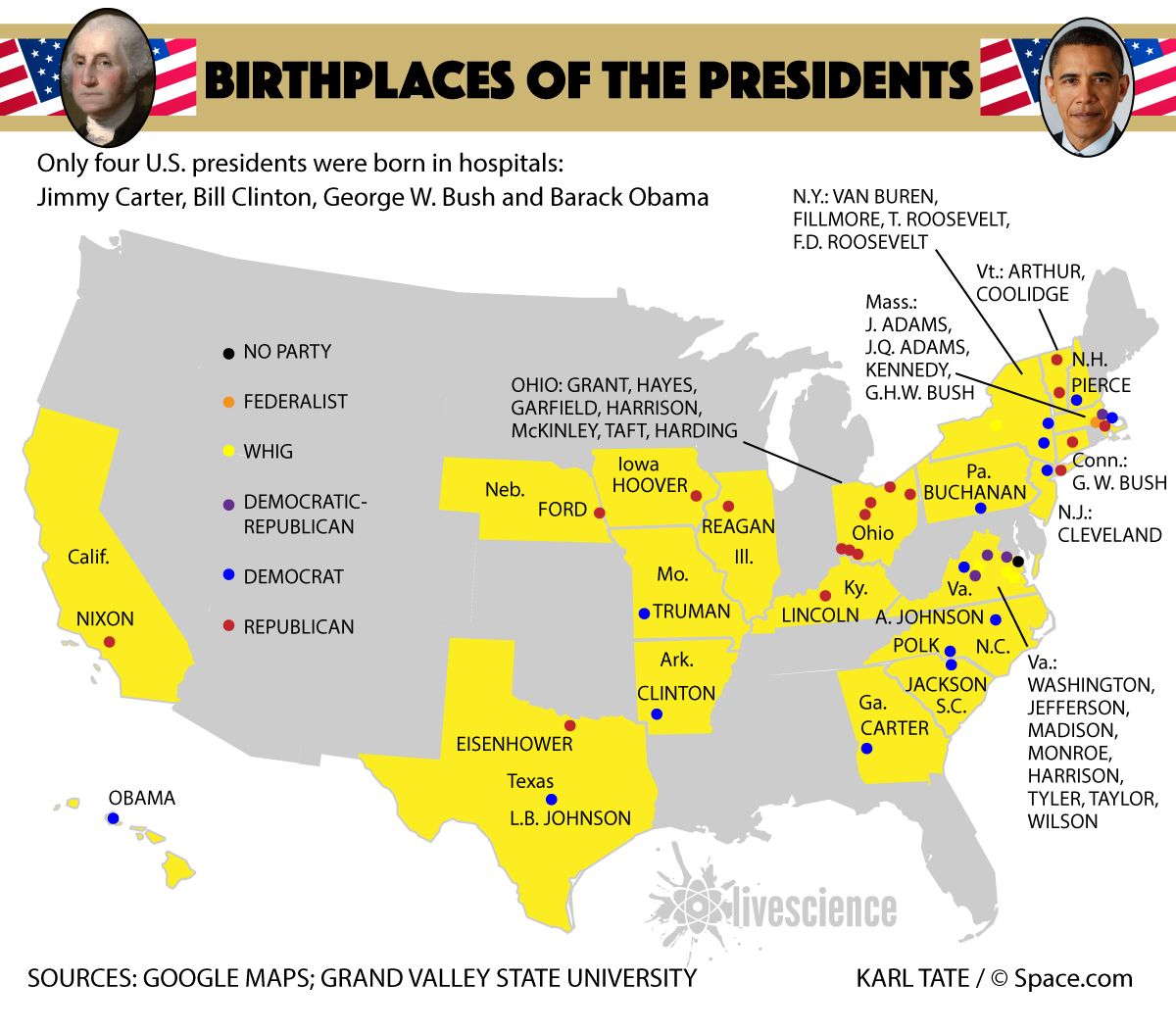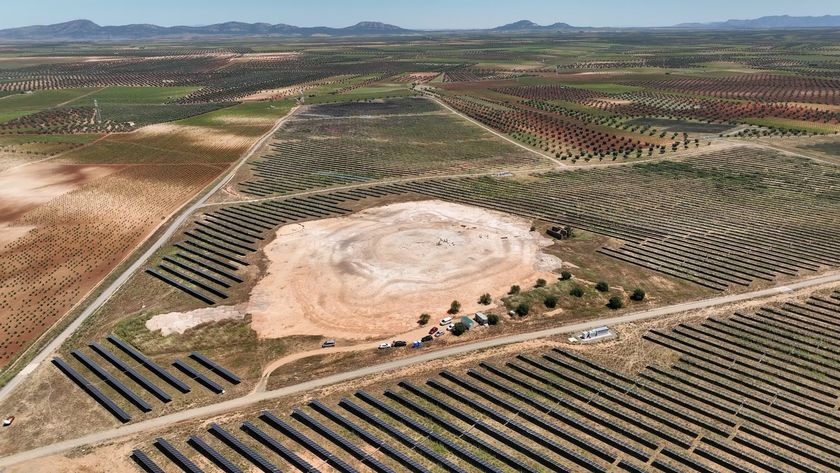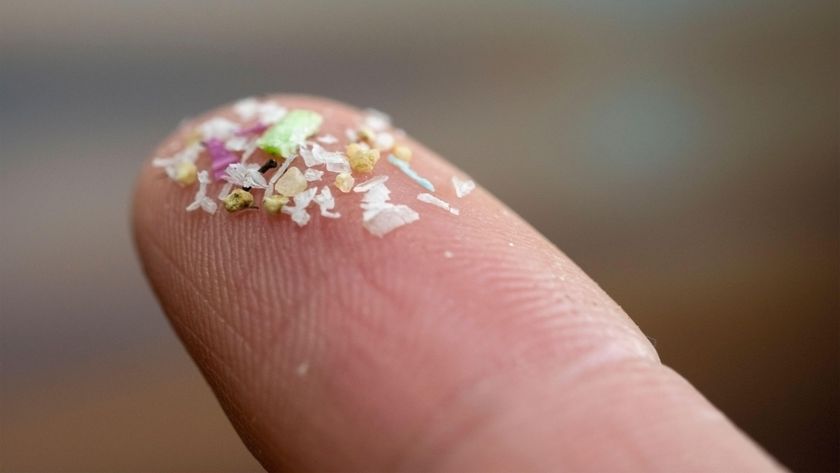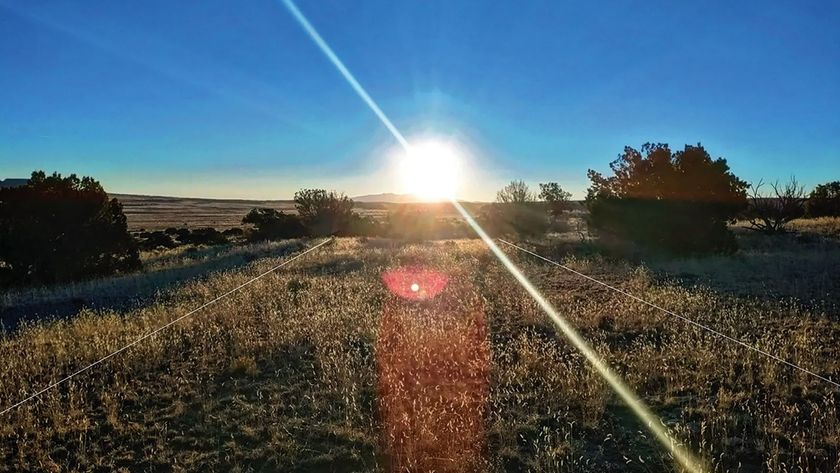
At the Republican debates last night, Donald Trump argued that fellow Republican presidential candidate Ted Cruz might be ineligible to be U.S. president, given that the Constitution requires the president to be a "natural born citizen" of the country. (Cruz was born in Canada, though his mother was an American citizen at the time of his birth.)
Some have argued that a 1952 law deems people with one American parent born outside the United States as nationals and citizens of the U.S. at birth. Others argue that the framers of the U.S. Constitution clearly meant someone born on American soil. One man, Houston attorney Newton Schwartz Sr., has even filed a suit against Cruz, aiming to settle the question before the primaries or party conventions get under way, Bloomberg Business reported.
Whatever your opinion may be, it is true that all of the presidents to date have been born in one of the 50 U.S. states. Live Science took a look at where the presidents were born. While the tally may have a lot to do with chance, the overall trends do reflect changes in the population, politics and attitudes of Americans over the years. [Map: See Where All the U.S. Presidents Were Born]
Proud to be an American
It's no surprise that all 44 presidents were born on U.S. soil: The requirement for a president to be a "natural born citizen" is enshrined in the U.S. Constitution. The current debate about what that means stems from the fact that there's no document trail to reveal what, exactly, the Constitution writers meant by that statement.
"This wasn't one of the big, burning questions at the Constitutional Convention," said James Melcher, a political science professor at the University of Maine at Farmington.
However, an early letter from Supreme Court Justice John Jay to George Washington reveals that the founders were likely trying to avoid foreign influence on American politics, Melcher said.
Sign up for the Live Science daily newsletter now
Get the world’s most fascinating discoveries delivered straight to your inbox.
At its birth, America was incredibly weak and insecure, and had recently been in a fight for its life against the British, Melcher said. "It was a little itty-bitty thing; it only had 5 million people," Melcher told Live Science.
So the law reflects distrust that a foreign power could unduly influence the course of the country and even command its armies, Melcher said.
"What [the founders] were trying to say is, 'We don't trust the British; they could try to infiltrate this new America and bring us down from the outside,'" said Larry Sabato Jr., director of the University of Virginia Center for Politics. "They were worried about a Manchurian candidate— except not Chinese, but British."
Electoral changes, population changes
All of the early presidents, except the John Adamses, hailed from Virginia, and eight presidents, or nearly one in five, were born in the state.
"Virginia was the most populous state in the country in the 18th century, and you had just a remarkable collection of intellectual firepower and leaders coming from there," Melcher said.
However, that early lead has since dissipated, and the last president from Virginia was Woodrow Wilson, who governed from 1913 to 1921.
Ohio is also disproportionately represented, claiming seven of the country's presidents. That reflects Ohio's historical brand of politics, as well as its more populous and prominent past, Melcher said.
"Ohio used to be a more central state in the country than it is now," not too far north or south, east or west, Melcher said.
In addition, the swing state's moderate, unheated and even bland political style played better in early electoral politics, Melcher said. Prior to 1968, state politicians got together in smoky rooms to pick presidential candidates, while primaries counted for relatively little. These backroom deal makers often picked someone who most of the state party leaders could get behind — often the opposite of someone with strong points of view, according to Melcher. Superstition may have played a role in the decision, too. Once one Ohioan made it to the Oval Office, state leaders might have decided that Ohioans were more likely to win, and thus might have been more willing to select a Buckeye State resident as their preferred presidential candidate, Melcher said.
However, since Warren G. Harding (who many blame for corruption scandals), no Ohioans have made it to the Oval Office. That likely reflects its dwindling population relative to the growth of the overall U.S. population, as well as changes in how presidential candidates are selected. With primaries playing a more central role in the process, winners tend to be more extreme candidates who can "fire up the base" — and that doesn't tend to jive with the mild-mannered Ohio strain of politics, Melcher said. [The 5 Nastiest, Strangest Political Elections in History]
Meanwhile, some of the most populous states — such as California, Texas and Pennsylvania — claim relatively few presidents. That is part history, part geography and part luck.
California earned its statehood in 1850, but the rest of the Southwest and the Rocky Mountain states took decades longer to become part of the United States.
"You had a lot of empty country and didn't have a lot of communication," Sabato said.
Therefore, anyone from California would have headed east to have any hope of winning the presidential election, Sabato said.
But Pennsylvania is even more bizarre. It was one of the original colonies (the Constitutional Convention occurred there), had a large population from the beginning and is even a swing state. Yet it has produced just one U.S. president — James Buchanan. Though Buchanan is considered by many to have been a "terrible" president who helped bring on the Civil War through inaction, it's a mystery as to why Pennsylvania hasn't produced more leaders, Sabato said.
Born at home
While Abraham Lincoln may have been the only president to have been born in a log cabin, his birth at home was completely unexceptional. All but four of the presidents were born at home: Jimmy Carter, George W. Bush, Bill Clinton and Barack Obama. The home-birth trend mirrors changes in American society. For instance, while just 1.36 percent of babies born in 2012 entered the world at home, about 95 percent were born at home in 1900, according to the Centers for Disease Control and Prevention. But by 1944, less than 44 percent of births occurred at home, according to the CDC.
But the stats on presidents' birth states can be a little misleading, Sabato said. Many presidents spent little time in their home state before heading off to greener political pastures. (For instance, although Ronald Reagan was born in Illinois, he first rose to power in California. And although George W. Bush was born in Connecticut, he came into big-league politics when he became the 46th governor of Texas.)
Beyond that, there have been almost 1 billion Americans in history, and just 43 have occupied the country's highest office, Sabato said. (Grover Cleveland gets counted twice.) Therefore, because the group of presidents is so small and there are so many factors affecting the outcome, it may be hard to draw any conclusions about how birthplace affects the odds of becoming president, he said.
"It is a haphazard process," Sabato said. "Politics is haphazard."
Editor's Note: This article was updated to add information about last night's Republican debate and the lawsuit filed against Ted Cruz.
Follow Tia Ghose on Twitterand Google+. Follow Live Science @livescience, Facebook & Google+. Original article on Live Science.

Tia is the managing editor and was previously a senior writer for Live Science. Her work has appeared in Scientific American, Wired.com and other outlets. She holds a master's degree in bioengineering from the University of Washington, a graduate certificate in science writing from UC Santa Cruz and a bachelor's degree in mechanical engineering from the University of Texas at Austin. Tia was part of a team at the Milwaukee Journal Sentinel that published the Empty Cradles series on preterm births, which won multiple awards, including the 2012 Casey Medal for Meritorious Journalism.

5,000-year-old fortress found in Spain contains mysterious burial of Roman-era man with dagger

'Plastics are there and seem to be getting worse': Viral study of microplastics in human brains shows worrisome trend, but has flaws

Lasers reveal 1,000-year-old Indigenous road near Chaco Canyon that aligns with the winter solstice